Srijit Mukherji ’s Sherdil: The Pilibhit Saga is an oddly attractive work. The sprawling forest stretches with their natural sounds of birds, animals and insects are captured with a captivating urgency by cinematographer Tiyash Sen. The greenery never glittered so vividly. The foliage never seemed for fearful. But this is not a film celebrating nature.
Quite the contrary _Sherdil_ makes a case for how life-threatening nature can be to the vulnerable. It is easy for environmentalists to sit in their air conditioned chambers and talk about environmental conversion. Those who are vulnerable to attacks by wild animals have a different story to tell.
When we first meet the innocent obstinate villager Gangaram, played with an uncanny artlessness and articulateness by Pankaj Tripathi, he is in the city pleading with the government clerk (played by the brilliant Vishwanath Chatterjee, seen in a similar role in the web series Gullak) for government funds to help his village tide over natural disasters. All he gets in return is petition advice.
In the face of government apathy Gangaram must resort to drastic measures. He fakes a terminal illness, and decides to go into the jungle and wait for a tiger to maul him to death so that his village would be allotted a government compensation of ten lakh rupees, arguing that if he must die he might as well do some good for his people.
Remember Amitabh Bachchan accepting a dangerous assignment for money after he is diagnosed with a brain tumor in Majboor? It is a scheme outrageous enough to outdo any offered the government. Pankaj Tripathi plunges into building a case for his character’s desperate remedy to bring relief in wasted neglected lives. Some of what transpires while Pankaj’s Ganagram waits for the tiger to attack him is clearly in the zone of the misaimed zeal for a lost cause.
Most embarrassing is Sayani Gupta as Gangram’s nagging wife who secretes a residue of love and respect for her husband. Sayani struggles with her tanned skin and rustic accent and comes up with an acutely artificial performance. The rest of the supporting cast is remarkably unremarkable, and maybe that’s the point of the whole success.
In a tone that lingers in a place between the grim and the giggly, writer-direct Srijit Mukherjee builds a case for the human factor to be prioritized in environmental arguments. Tripathi is especially persuasive in the courtroom sequence towards the end where he pleads with the Judge for villagers to be placed in a jungle habitat where he promises they will live and behave like animals in cages.
The film constantly reminds us of the imbalances that underline all environmental discussions which are heavily weighed against the human factor. Pankaj Tripathi projects the anguished plight of a rural Indian who is bewildered by the lopsided respect accorded to Nature and animals. But what about human beings whom Nature attacks with furious intensity washing away villages during floods, rendering human casualties into food for wild animals?
Once Gangaram gets into the jungle to become a meal for a passing tiger, the narrative, sluggish from the start, loses momentum. The introduction of the talented Neeraj Kabi as a poacher and an animal hunter, brings some respite to the narrative of stonecold isolation. Kabi’s character Jim with his beaded long hair and arguments on why animal preservation is not always a wise option, says he is inspired by Jim Corbett. The Tripathi-Kabi discourse needed much more fleshing out. Sherdil: The Pilibhit Saga stands out for its anti-conformist argument on what role nature should play in an ordinary man’s life, and how far an underdog should go for his voice to be heard.
Subhash K Jha is a Patna-based film critic who has been writing about Bollywood for long enough to know the industry inside out. He tweets at @SubhashK_Jha. Read all the Latest News , Trending News , Cricket News , Bollywood News , India News and Entertainment News here. Follow us on Facebook, Twitter and Instagram.


)
)
)
)
)
)
)
)
)



